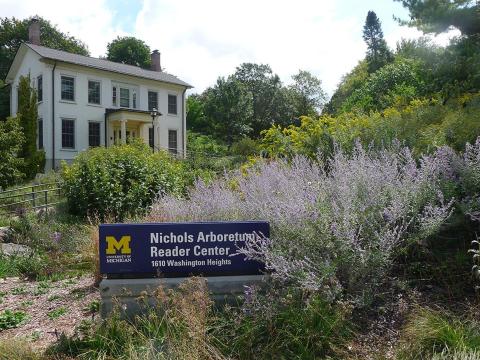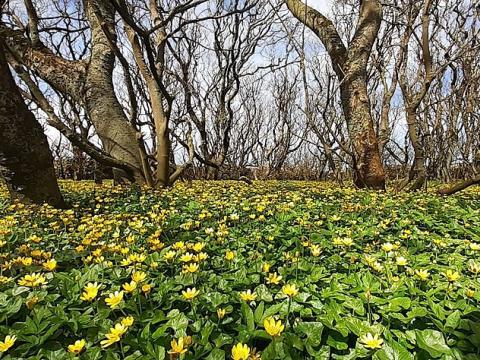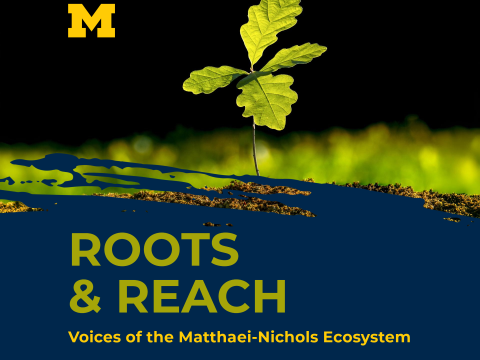In the winter season at Matthaei Botanical Gardens, as the lush garden beds go to rest and the world outside quiets, experimentation is still afoot in the back rooms on site. In one room, a large oven dries soil samples for researchers studying sustainable agriculture practices. Will Brinkerhoff, a PhD candidate in the School for Environment and Sustainability, is interested in how well-managed grazing by cattle can influence soil carbon and nutrient levels. Working alongside other researchers in Dr. Jennifer Blesh's Soil and Agroecosystems Lab, his dissertation research has two main branches connected by an umbrella theme of circularizing the nutrient economy of farming systems.
“We’re trying to find where we have stockpiled nutrients in the system and where we are using fossil fuel-derived fertilizers. We are trying to switch those two out to recycle nutrients already in the system rather than produce more. And the second branch of that is once we find out how to swap those two, sustainably applying them at the right time and in the right quantity so they don't run off.”
His current experiment involves growing cover crops, like ryegrass and clover, which can be planted in the Fall to retain nutrients and reduce erosion over the winter – and grazing them with cattle to potentially enhance soil carbon sequestration. While cattle operations are often net carbon sources, research is illuminating how properly managed operations can increase productivity and ecosystem services. With herds in the right numbers, the natural disruption and trampling of hooves can aerate the soil and embed organic matter deep in it, locking it away. The soil samples for Will’s research study are processed and dried on-site here at Matthaei.
“I think, in general, if you're ever given a simple and straightforward answer to sustainability, you're probably not hearing the whole story. And so, with cattle, we often hear stories about how they're bad for systems and create a lot of greenhouse gases. I like to put out there that cattle are important parts of the farming system if managed properly.”
In the current system in the US, most farmers grow crops, often corn or soybeans, and leave these fields bare outside of the growing season. Will is experimenting with growing an overwintering cover crop in farm fields in Dexter and Kalamazoo, MI. These fields are working farm sites, which Will explains will help results directly apply to real-world farming systems. The cover crop species, mainly legumes and grasses, come from a cover crop mix that has been tested here at the UM Campus Farm. The idea is that these plants can take in the excess nutrients on the field and store them in their plant matter while preventing nutrient runoff by stabilizing soil with their root systems.
Will is also applying another treatment: grazing the cover crops over the winter multiple times with cattle to see if their waste can help retain nutrients and sequester soil carbon.. “Cows are excellent recyclers of plant matter. They eat organic matter and quickly break it down in their stomachs, and then what comes out is still full of nitrogen and carbon. It's kind of a perfect organic fertilizer in their manure. So my experiment is testing to what extent using cattle to graze cover crops is an effective way to provide fertilizer to those fields and retain nutrients in the system.”
Although he is clear in his support of well-managed grazing practices, Will is also clear that much of how we currently produce beef and dairy in America is not sustainable. But that doesn't mean there isn’t a good way to do it for the system, he explains; it just needs more support. “One of the biggest things we're lacking right now is governmental support for small-scale sustainable farmers. So if a farmer wants to put in all this effort to have a sustainable and healthy operation for the land and the community, they are not getting government assistance most of the time.”
Eventually, he hopes the results of this research will help this issue, clarifying which practices are most effective and worth focusing on at a large scale to make agriculture more sustainable. In the meantime, a call to action for those who have the ability is to focus on supporting local, sustainable efforts. “It's important as communities to support farmers focusing on sustainable practices and to show them that it's something that you care about: by buying produce from them, taking the extra time to go to the farmers market, go to their farm stands, or buy a CSA from them.”





